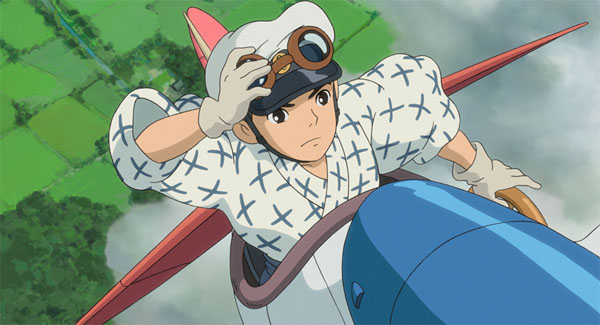While we’ve been tracking critical reaction to Hayao Miyazaki’s final feature since it opened in Japan in July, adding links to reviews right on through last month, when The Wind Rises was a Special Presentation in Toronto, it screens once more at the New York Film Festival this evening. And so, one more round.
“In the oneiric opening sequence of Hayao Miyazaki’s gorgeous animated drama The Wind Rises,” begins Fernando F. Croce at Reverse Shot, “a boy climbs to the roof of his house to gaze at the stars and finds a small flying contraption waiting for him. He leaps in without a moment’s hesitation and takes off, happily zipping through the air until the skies above him suddenly grow dark with dirigible bombers. The child’s simple and delighted acceptance of the fantastic, as well as the way the joyous scene turns abruptly ominous, is crystalline Miyazaki. The rest of the film remains firmly situated in the adult world, yet The Wind Rises never loses the guileless spark of this early passage, even as its protagonist comes to grapple with increasingly grave issues. It’s the inspired and contemplative work of a septuagenarian artist who still sees with the eyes of a youthful dreamer.”
Jesse Cataldo in Slant: “The story of engineer Jirô Horikoshi (Hideaki Anno) as he grows from a flight-obsessed child to the designer of the dreaded Zero aircraft, the film hopscotches across a series of defining incidents in his life, charting the development of a man who, like Miyazaki (and perhaps his own father, who owned an airplane factory), dreams only of creating something beautiful…. The Wind Rises never denies its core ethical conundrum, that the striving, idealistic producer of such wondrous creations is also a pawn in service of a megalomaniacal regime, that his tools will wreak annihilation and cause the same to be returned upon his own friends and family. Instead it incorporates those contradictions into a mournful, even fatalistic, worldview. Sharp hints of longing have always added depth to the director’s fantastical reveries, but here that nostalgia is for a world that actually existed beyond childhood daydreams, with interbellum Japan presented as both a poverty-choked backwater and an Edenic pastoral wonderland.”
“Whereas many of Miyazaki’s films have zeroed in on a condensed passage of youth so as to amplify the developmental epiphanies contained within,” writes Carson Lund at In Review Online, “here he indulges a much broader canvas with ambitions of investigating the particular forces that bind a lifetime together. The rather hokey metaphorical framing device of wind manifests these forces; wind is the meteorological force that facilitates literal flight as well as the ineffable force of fate that leads Jiro to his eventual wife, Naoko (Miori Takimoto). In theory, Miyazaki’s guiding motif is an elegant way of distilling the shifting and swirling tides that make up our lives; in execution, though, it has the effect of steamrolling over the more challenging nuances of Jiro’s life and his relationships.”
“The film has been under attack by Japanese conservatives for its antiwar message,” notes Martin Tsai in the Critic’s Notebook. “Mr. Miyazaki’s stance has actually never waivered (Nausicaä of the Valley of the Wind and Princess Mononoke immediately come to mind), but apparently the Japanese neocons find historical facts far more nagging than allegories with mutant insects and giant wolves…. The sappy star-crossed romance—complete with terminal illness— … is another biography altogether, drawn from poet Tatsuo Hori’s eponymous novel loosely based on his own life (which was adapted for live-action films in 1954 and 1976). Ultimately, The Wind Rises will mean the most to fans who’ve grown up watching Mr. Miyazaki’s work.”
“Compared to his towering career achievement, The Wind Rises feels like a minor footnote at the end of his illustrious career,” writes Seongyong Cho at RogerEbert.com. But for Vulture‘s Bilge Ebiri, this is “a sublime journey into the very nature of inspiration, from one of the world’s most idiosyncratic filmmakers.”
The Wind Rises is one of six films Peter Labuza and Carson Lund discuss in the Cinephiliacs podcast.
Updates, 12/23: “In the past, Miyazaki has celebrated the free play of the imagination as a buffer against industrialization (Spirited Away), environmental devastation (Princess Mononoke), and war (Howl’s Moving Castle),” writes Max Nelson for Film Comment. “Like those films, The Wind Rises is a declaration of faith in the power of dreams to streamline work, life, and love into a single, frictionless whole—an ideal represented here by Jiro’s design for an impossibly light and fast fighter plane. The trouble is that, in the war-torn world of The Wind Rises, dreaming in the abstract about lightness and grace is dangerously close to dreaming up new and better ways to kill.” Still: ” It’s hard to imagine a finer send-off than this delicate, rueful, and achingly sad film, in which the capacity to dream comes off both as saving grace and tragic flaw.”
“Japan scholar Hanna McGaughey, a personal friend, has stated in private conversations that ‘pussyfooting’ around war crimes is the only strategy Miyazaki had at his disposal to avoid being dismissed by his domestic audience as ‘silly’ or ‘inappropriate,'” writes Inkoo Kang for the LA Weekly. “But there’s no reason why critics and audiences outside of Japan should be morally complacent in the animator’s concessions to his countrymen’s egos. The Wind Rises perpetuates Japanese society’s deliberate misremembering and rewriting of history, which cast the former Empire of the Rising Sun as a victim of World War II, while glossing over—or in some cases completely ignoring — the mass death and suffering its military perpetrated. Critics who fail to observe or protest Miyazaki’s ‘pussyfooting’ around a regime that caused more deaths than the Holocaust aid and abet Japan’s continued whitewashing of its war crimes.”
NYFF 2013 Index. For news and tips throughout the day every day, follow @KeyframeDaily on Twitter and/or the RSS feed. Get Keyframe Daily in your inbox by signing in at fandor.com/daily.




